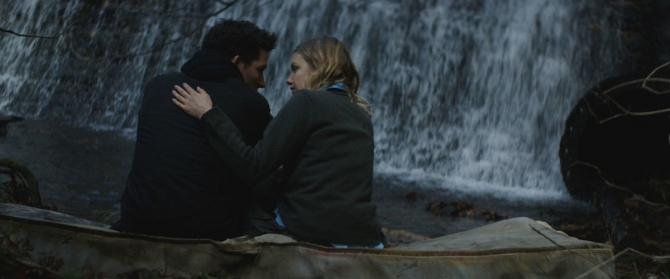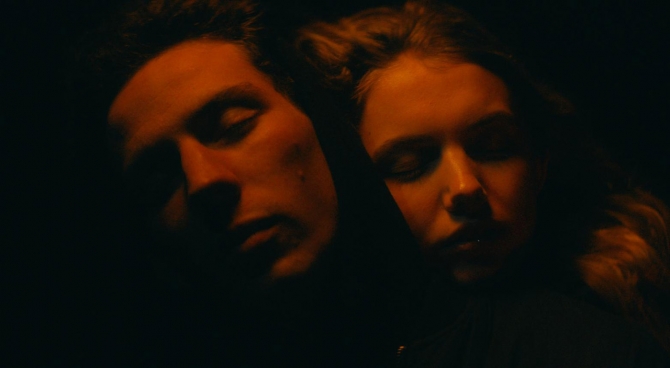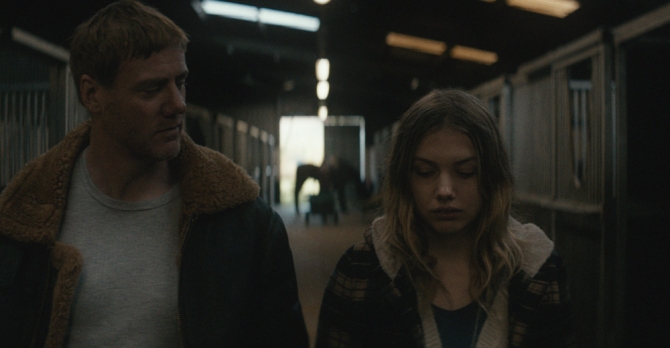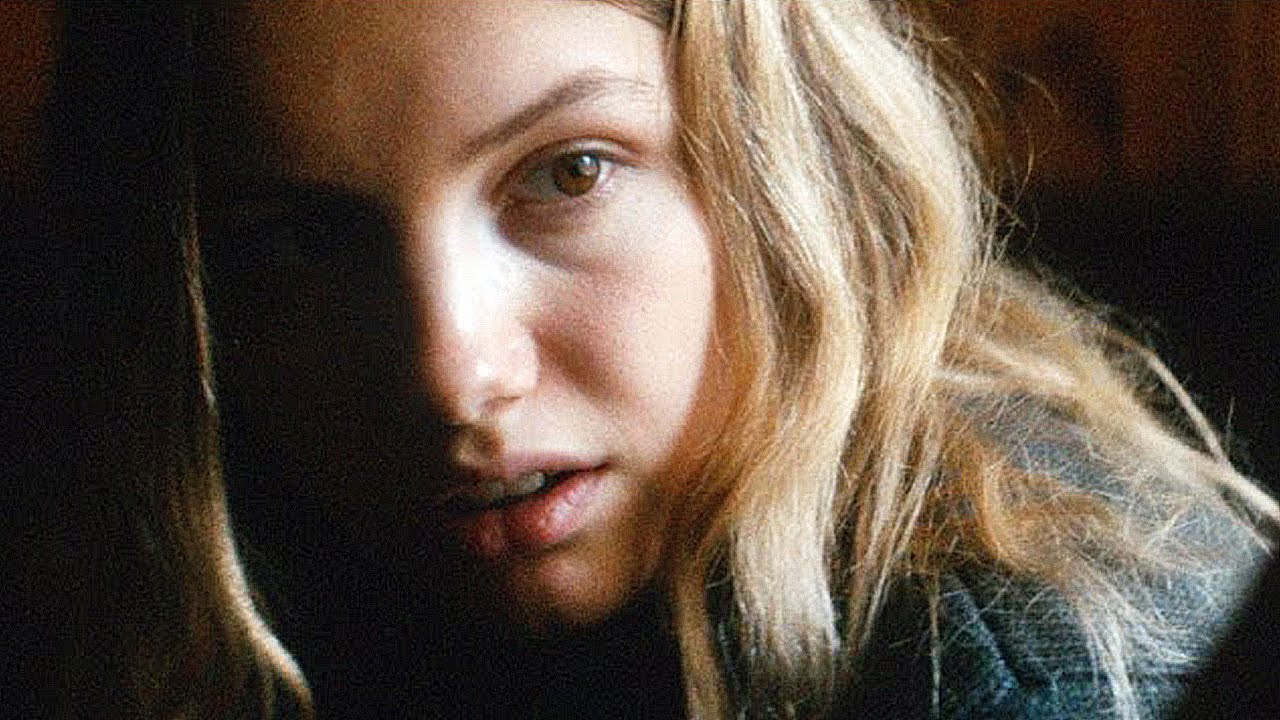Bridgend deals with a subject that few filmmakers or actors would dare approach. A fictionalised story loosely based on a spate of tragic deaths which occurred in South Wales about a decade ago, it’s a drama that deals with some extremely difficult topics head-on.
The feature debut from Danish documentary filmmaker Jeppe Rønde, Bridgend stars Hannah Murray as Sara, a teenager who moves to the former mining town of the title with her father, a policeman (Steven Waddington). Bridgend is emotionally haunted by a string of suicides among its youth; as Sara’s drawn into the town’s isolated clique of teenagers, the movie paints a bleak portrait of disaffection and obsessive relationships.
For Murray, best known for her roles in Game Of Thrones and Skins, Bridgend was evidently a difficult film to make, both physically and emotionally, but the results are worthwhile: it’s a raw yet absorbing and elegantly minimal drama.
As Bridgend emerges on DVD and Blu-ray in the UK, here’s our interview with Murray, where she talks about the decision to take on such a challenging role, her acting process, plus, naturally, a bit of chat about Game Of Thrones and why she wound up stealing a pair of socks…
You must have balked at this role at first, I’d have thought.
I did, yeah. It was a really tricky decision as to whether or not I wanted to take it. I was kind of on the fence throughout the whole auditioning process, and I was really intrigued by the script, and I was really intrigued by Jeppe [Rønde, director] – I met him twice before I got the part. But I really didn’t want to be in a bad film, or an insensitive film about this subject, and I had to know that I trusted this guy, and that he’s doing it for the right reasons.
So after they offered me the part, I went for dinner with him to find out more. My main reasoning was, “I want to know why you want to make this film.” And when I found out that he’d researched it for six years, I sort of thought, okay, you’re really serious. I also thought, you’re a really interesting person, I think you’re really compassionate about the subject matter. I felt it was going to be something difficult but really worthwhile to explore, hopefully. And yeah, I’m really proud of how it’s turned out. It’s a really different film.
The other thing that was important for me in deciding I wanted to do it was that, in my last audition, Jeppe really, really pushed me, and I felt like I left the room knowing there was something he wanted and I felt like, as an actor, I didn’t have access to those kinds of emotional places. He doesn’t let you get away with anything – he has really high standards. I left the room thinking I was sure I’m not going to get it, because I don’t think I’m capable of what he wants. I made my peace with it, so when I got offered the job I was really surprised. I realised he was really going to put me through the mill. This was really going to change me as an actor. The performance style that he demands from everyone is really about minimalism and naturalism – and I think that was the only way to tell the story respectfully was to do it in that style. Also, there’s so much ambiguity in the film, particularly around the ending, and I think that’s really respectful – it’s good to leave those gaps for people to make their own decisions.

Did he tell you why he decided to make this as a feature film rather than a documentary?
He wrote a story about it in the Danish newspapers, and he just went, I’m fascinated by this subject matter. He spent more and more time in Bridgend, and he became close friends with the community. I think in the beginning, he didn’t know what this was – if it was anything. If it was just his own personal desire to explore this further or if there was a documentary there. The more time he spent there, the more he realised this was going to be a fictional [film] and not a documentary. That’s the other important thing to state about this project, which is that although it’s set against the backdrop of true events, it’s not a true story. We’re not playing real people. It is a fiction. I’m not depicting a real person. In some ways, I wonder what impact this film will have on someone who didn’t know about the case of Bridgend. I think it can stand alone as a narrative.
I didn’t know a great deal. I think that might be why it had such an impact on me. It gets to something the media didn’t, in a way: the humanity of the situation rather than the headlines.
Yeah. When I was preparing for the role I read as much as I could – all the news stories I could find. And a lot of it was tabloid stuff, and I felt yeah, it was very sensationalised, and also very judgmental, very unkind, very non-compassionate. Whatever the opposite of compassionate is! I think there’s something that fiction can do that fact-telling can’t; there’s a reason why we tell stories. Particularly with really dark, challenging stuff, I think the things I’ve really learned a lot from have come from reading stories rather than watching documentaries or the news. So yeah, I think it is important. Personally, I don’t believe in censorship, and I don’t believe in not talking about things. I think, if you’re going to censor art, if you’re saying people can’t represent things, that’s really dangerous. I love a romantic comedy, I love a musical, but as people I think we really need to think about this kind of stuff, and we need to challenge ourselves with things that are upsetting and hard sometimes. Because otherwise, we’re never going to figure out a way to stop these things from happening.

People often put a lot of stock in the physical demands of a performance – like in The Revenant, Leonardo DiCaprio slept inside a horse, that kind of thing – but what about the psychological toll? And what was it like to put this character away at the end of it?
It was physically and emotionally the toughest job I’ve ever done. It was a joke how many bruises I had on my body every day. I’d go into costume and makeup every morning and go, “Look at me!” Because my arms were covered [in bruises]. Because you want everything to be real. That was the other thing with Jeppe from day one: we’re not going to fake anything. It’s got to feel real, and it’s got to feel true. I was being dragged around by Steve Waddington. I banged my head against a wall for real. I was swimming in a lake in November. I quite like that kind of thing, because our job as an actor can be a bit namby-pamby and silly sometimes, and people think it’s not a proper job. But most actors are like, “Look at my scars! I’m really tough!” Me and Josh were comparing scars. I’m a really good actor because I’ve got a bruise on my wrist! But yeah, it was just exhausting in all those ways.
I know people say this a lot, but we were like a family, the cast and crew. And I felt really safe and supported by that, and I think everyone really looked after each other. Particularly Steve and Josh, they took really good care of me, and were always aware of the places we were having to go to emotionally, and just checking in with each other. Saying, “Are you alright?” Which is lovely.
I’m not a method actor – I don’t like to go home and stay [in character]. I think for me at least, it’s important to go back to the hotel and have a drink and have a laugh or whatever, because otherwise you’d go a bit mad. I also find it interesting sometimes, because I’m really bad at crying, and I have to cry a lot. A coach from a drama school said, “You don’t have to make yourself feel really sad to make yourself cry. You just need to stoke the fires of emotion. But emotion can go in any direction.”
To do my job well, I need to be really free and playful. And so sometimes that does mean mucking around before a take, and then weirdly, that enables you to go further into the darkness. So there’s a strange kind of friction. Saying we had a good time making this film sounds somehow insensitive, but if we didn’t do the right thing for our jobs, then the film would be bad, and that would be much more disrespectful. So I felt like, after it ended I needed a break. I also remember saying to someone, when I first watched the film on the big screen, I was thinking, “I don’t know how many of those I have in me.” Like, in my life – how many parts like that I could do.
My last three jobs, in between Game Of Thrones, have all been really bleak, and a lot of crying. I sort of see them as a trilogy about obsessive love – one of them’s a play in London. And I’m really, really longing to do something light and fun and silly. The last time I was in Glasgow was to promote a musical, so it was weird being here doing a Q&A, when the last time I was here doing a Q&A was for a musical – that was the sunniest, most lighthearted thing I’ve ever done. And I think I do need to balance that, in terms of going back and forth. Human nature can be beautiful, and parts of it can be bleak and hard. I think I want to explore both directions. That’s the main thing for me: I want to commit to something as fully as I can, but then take a step back and make sure I’m looking after myself afterwards. Don’t let yourself live in it for a year; recognise you’ve worn yourself out emotionally. Recharge your batteries, I suppose.
I sound like an old man, but have you seen this film with any young people? Have you had any reaction from teenagers?
I’ve only seen it at two festival releases; one was in Rotterdam, and one was in New York. I don’t remember the age demographic; I haven’t spoken to any teenagers. I can’t answer your question is what I’m saying!
No, that’s fine. I’d just be interested to know, because I think the film exposes something about the way teenagers interact and use the internet. It’s only a small part of the film, but they create a little bubble for themselves on the web.
I was talking about that to someone yesterday, actually. You don’t see a mobile phone in the whole film. The question of when it’s set is slightly non-specific. But it’s a tiny microcosm of a community – we’re shooting in a village where everything’s in walking distance or our locations were so close. In this context, it’s just as easy to knock on a friend’s front door as send a text. I think in a lot of ways, technology can be really alienating.

How does filming Game Of Thrones compare to this, specifically, because Game Of Thrones is TV, but its budget is massive.
It was interesting, I shot on Game Of Thrones in the middle of doing Bridgend. So I had this crazy turnaround, where I shot until about three or four in the afternoon, got driven to the airport, jumped on a plane to Belfast, woke up the next day, filmed, got straight back on the plane and went back again. It was really difficult. I’d already done a week on Bridgend at that point, and it was really, really low-budget filmmaking. Then the week before I was doing this scene at Castle Black, which was this incredible fully-built set with a hundred extras all on horses, and there were crane shots. I was just like, there are very different ways of making narrative art! [Laughs]
I went back to traipsing around in a muddy field [for Bridgend]. Actually, mud is a link between the two. It couldn’t be more different. But it’s amazing what they have the luxury of doing on Thrones in terms of money and time. How fully realised that world is able to be. The detail with which the costume, makeup, hair, prosthetics, special effects is phenomenal. And you need that to tell that kind of story; if you’re going to tell a medieval fantasy, you need that. So I always feel really, really lucky to be this little cog in this giant machine, this incredible, epic thing. It really takes my breath away, to be honest.
I remember, I think I stole some waterproof socks. I was in costume, and I said, “Can I take these socks back to my little low-budget Danish movie in Wales, because we don’t proper socks and my feet are getting really wet?” [Laughs] It’s definitely a bit comfier on a big HBO series. But like I say, I really love the variety of what I do, particularly when you get to do those things right back to back. I remember on season three of Game Of Thrones, I was doing a movie in New York, playing a super-modern, leather jacket-wearing, cigarette smoking fashion student, and then I flew back and did Game Of Thrones. It can be a bit disorientating to go from one character to the other, but it really reminds me of how exciting and varied this job can be.
Hannah Murray, thank you very much.
Bridgend is out on DVD and Blu-ray now.

